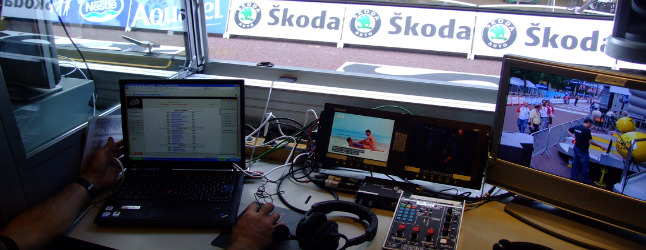Last updated on November 15th, 2020 at 09:03 pm
Often confusing, irritating and hilarious in equal measures, commentary in racing games has for too long been appalling. The PlayStation’s F1 ‘97 was legendary for all the wrong reasons. Murray Walker is, in my opinion, the greatest commentator of all time in any sport, but the game made him out to be some kind of maniac hell-bent on listing who the top-ten drivers were at least twice per-lap and only reacting to major incidents at least half a minute after they had occurred. And whilst that game was released thirteen years ago, things have not improved much.
Commentary Box image on Flickr by sbisson. (CC Licence)
I argue that such poor commentary systems detract from the overall experience of the game and serve to undermine the user’s enjoyment of playing it. I have never understood why commentary in racing games use such few phrases – it seems like developers get the voice talent into the recording studio and then say ‘well, we’ll need you to record a bit for the start… um, say the driver’s names… do a couple of exclamations for crashes and stuff… and then we’ll just loop them a few times and we can all go home early and pat ourselves on the back’. The result of this lack of variety is that repetitive, benign, irritating and distracting voices have left gamers frustrated for far too long. I believe is also a very valid argument for actually killing developers who have released an ‘update game’ twelve months on from the first and haven’t even bothered to update the commentary, let alone improve it. ‘Well, we all said it was brilliant last year, so let’s just use it again’. There is simply no excuse.
Racing games are obviously not the only culprit when it comes to appalling commentary. The Pro Evolution Soccer series for example has had terrible commentary for such a long time that it’s fans have come to regard it as more charming than irritating, hence this amusing tribute which is not too far off the real thing. Some blame the commentators themselves, some the programming code, and others the like-for-like Japanese translations which have made many a Nintendo game all the more amusing over the years. But in this day and age and as technology advances, I say the time has come for this practice to cease.
Not all racing games are culprits – for example the Gran Turismo series has never had a commentator, but does instead insist on giving you background music as the default setting. Kazunori Yamauchi and Polyphony Digital may be the kings of the simulation, but I personally have never seen a racing car with a working radio inside it. Thankfully you can turn this off in the options menu and avoid the noise of generic rock music drowning out the beautifully-recreated sound of your roaring engine.
The key debate regarding in-game commentary lies in whether a sports game chooses to simulate the sport or the TV presentation of it. Games have for too long been stuck in limbo – a hybrid area between the two that doesn’t make sense to the gamer. There is no reason in a racing game for the player to be able to hear a television commentator during the race, let alone a television commentator AND an engineer broadcasting pit-to-car radio transmissions – such as in F1 2006 on the PS2. In Codemasters’ Colin McRae: Dirt, your co-driver Travis Pastrana is not only the in-game voiceover but also races against you, which makes it pretty difficult to suspend your disbelief. Are we to presume Travis is reading our pace notes whilst driving his own car? Or are there two of Travis Pastrana? Thankfully Dirt:2 provides the option to choose a different voice, although all of the potential selections sound nothing like they have ever been anywhere near a fast-moving vehicle, and suspiciously more like they have spent the morning sat in a recording booth helping themselves to too many free croissants.
To solve this gaming commentary crisis, I suggest this: the answer for developers is to make a choice about what they are choosing to represent – it has to be either the driving simulation or the broadcast simulation and make no attempt to create the ‘best of both worlds’. Studios must choose one option and stick to it, because a half-way house is never satisfying for the user, always confusing, and I would argue is yet to work effectively in any racing game to date.
Codemasters appear to be on the ball with this idea and have decided against having any in-game commentary for their fantastic-looking forthcoming F1 2010. Until such times as in-game commentary can be advanced enough that we hear intelligent comments from Jonathan Legard and Martin Brundle that relate directly to the action, and we can see and hear authentic, competent and articulate virtual versions of Jake Humphrey, David Coulthard and Eddie Jordan making specific post-race assessments of my driving then surely, for now at least, less has to be more. I would love for this approach to work properly but I think a satisfying simulation is a fair few years off yet. So for now, I say scrap the TV-route altogether and stick to simulating the driving experience. OK?!

Leave a Reply